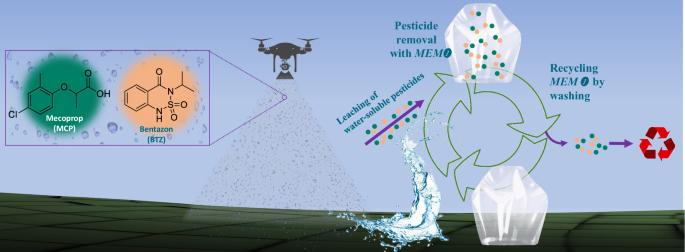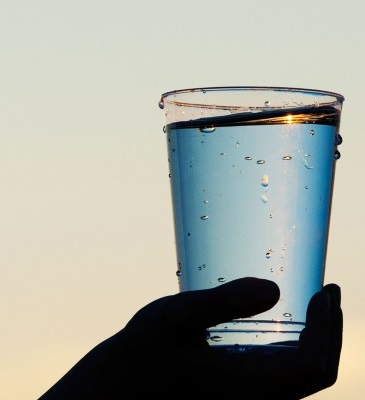Reusable and effective polyacrylic membranes for mecoprop and bentazon extractions
IF 10.4
1区 工程技术
Q1 ENGINEERING, CHEMICAL
引用次数: 0
Abstract
This study introduces reusable polyacrylic membranes, fabricated from commercially available monomers (1-vinyl-2-pyrrolidone and methylmethacrylate), as a promising approach for pesticide extraction. These membranes effectively remove the commonly used herbicides mecoprop (RE ≈ 99%) and bentazon (RE ≈ 95%) at low concentrations, which pose water contamination risks due to their water-soluble properties and leaf-level sorption. The membranes exhibit excellent manageability and resistance, allowing for safe handling without personal protective equipment. Additionally, the material is environmentally friendly and can be washed and reused for at least 4 cycles without a significant decrease in performance. Characterization techniques, including NMR, TGA, DSC, mechanical testing, N2 adsorption, and FTIR analysis, were used to investigate properties and assess the influence of the polymeric composition. The study focused on examining the lateral charged aminoethyl groups, which play a crucial role in sorbent-sorbate interactions. Sorption kinetics, isotherms, and permeation studies provided insights into the removal mechanism, efficiency, and permeability coefficients, revealing hydrophobic–hydrophobic interactions between the pesticides and the polymer. Molecular dynamics simulations revealed a scorpion-like conformation of the macromolecular chains surrounding the pesticides. These findings support the hydrophobic nature of the extraction mechanism and highlight the significant role of charged aminoethyl groups in facilitating this process.

可重复使用的高效聚丙烯膜,用于麦草畏和苯达松萃取
本研究介绍了可重复使用的聚丙烯酸膜,该膜由市售单体(1-乙烯基-2-吡咯烷酮和甲基丙烯酸甲酯)制成,是一种很有前景的农药提取方法。这些膜能有效去除低浓度的常用除草剂麦草畏(RE ≈ 99%)和苯达松(RE ≈ 95%)。这种膜具有出色的可管理性和耐受性,无需个人防护设备即可安全处理。此外,这种材料对环境友好,可以清洗和重复使用至少 4 次,而性能不会明显降低。表征技术包括 NMR、TGA、DSC、机械测试、N2 吸附和傅立叶变换红外分析,用于研究性能和评估聚合物成分的影响。研究重点是检测在吸附剂与吸附剂相互作用中起关键作用的带横向电荷的氨基乙基。吸附动力学、等温线和渗透研究有助于深入了解去除机制、效率和渗透系数,揭示了农药与聚合物之间的疏水-疏水相互作用。分子动力学模拟显示,围绕杀虫剂的大分子链呈蝎子状构象。这些发现支持了萃取机制的疏水性,并强调了带电氨基乙基基团在促进这一过程中的重要作用。
本文章由计算机程序翻译,如有差异,请以英文原文为准。
求助全文
约1分钟内获得全文
求助全文
来源期刊

npj Clean Water
Environmental Science-Water Science and Technology
CiteScore
15.30
自引率
2.60%
发文量
61
审稿时长
5 weeks
期刊介绍:
npj Clean Water publishes high-quality papers that report cutting-edge science, technology, applications, policies, and societal issues contributing to a more sustainable supply of clean water. The journal's publications may also support and accelerate the achievement of Sustainable Development Goal 6, which focuses on clean water and sanitation.
 求助内容:
求助内容: 应助结果提醒方式:
应助结果提醒方式:


